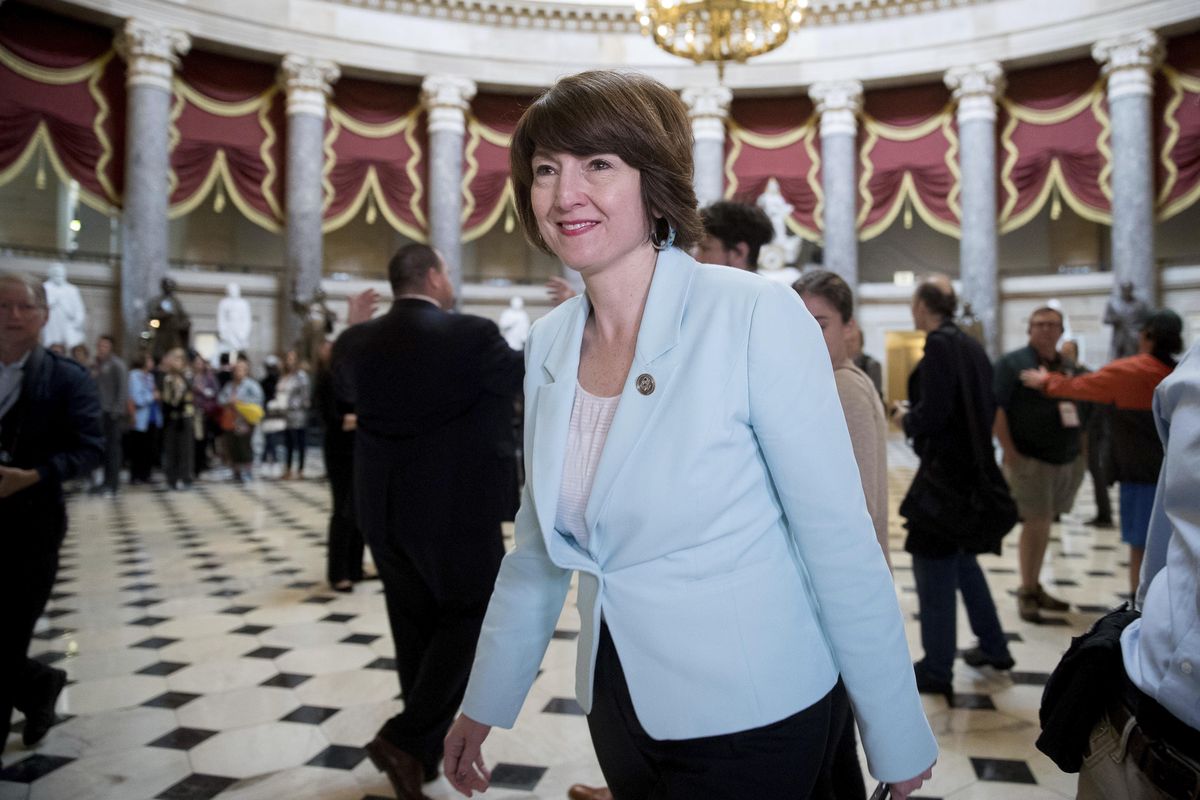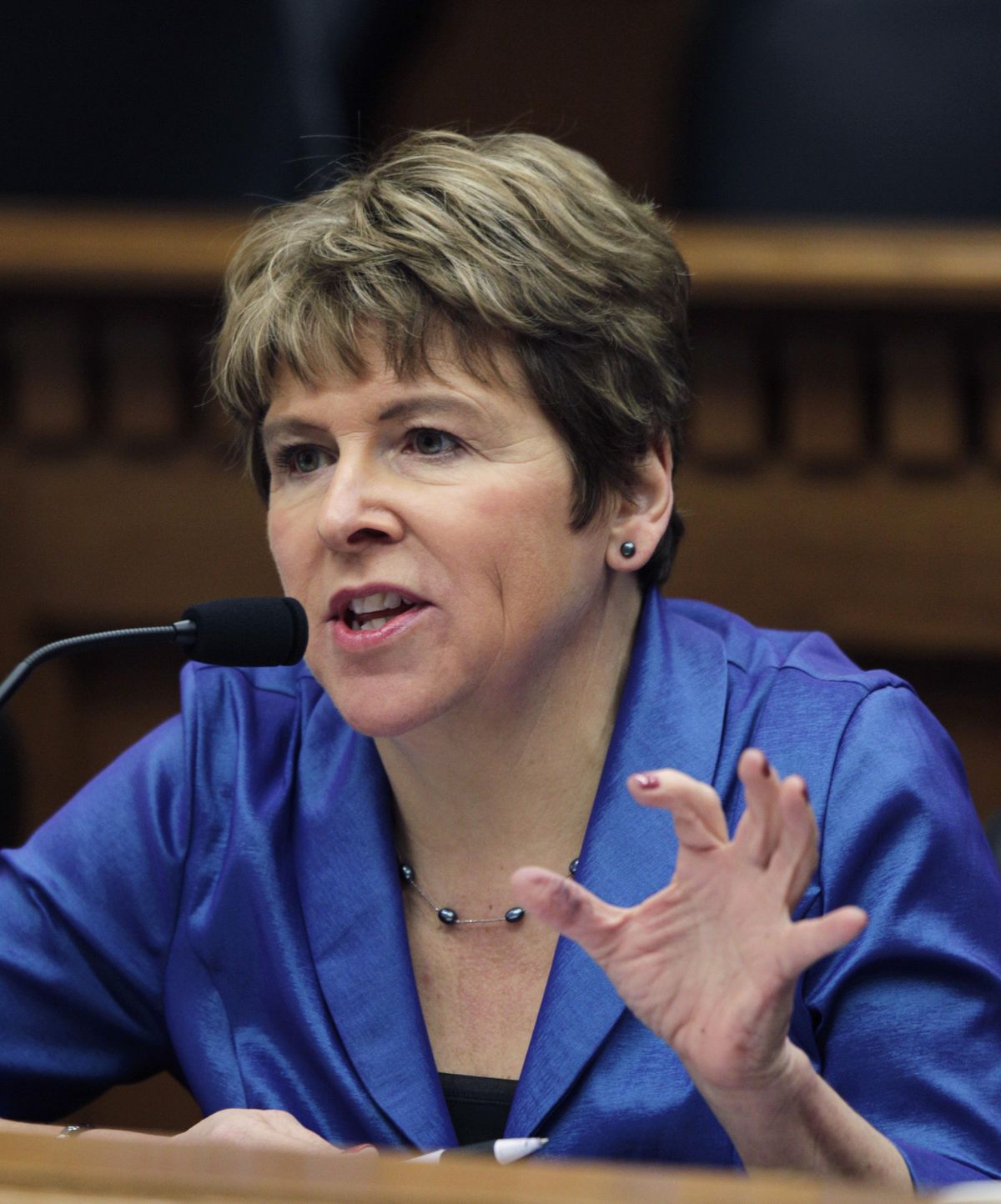McMorris Rodgers, challengers talk health care after tumultuous summer in Congress
Rep. Cathy McMorris Rodgers, R-Wash. walks into the House Chamber on Capitol Hill in Washington, Thursday, May 4, 2017. (Andrew Harnik / Associated Press)
The race for Spokane’s seat in Congress is solidifying at the end of a summer fraught with tumult for the nation’s health care system.
In May, Rep. Cathy McMorris Rodgers was one of 216 Republican lawmakers who narrowly approved legislation designed as a first step in repealing the Affordable Care Act. The proposal has stalled in the U.S. Senate, and the congresswoman faced pointed questions about her support for the bill at a packed town hall in Spokane a few weeks ago.
McMorris Rodgers defended the legislation as “one piece” of Republican efforts to improve the nation’s health care system in an interview Friday.
“We also need to address what’s driving the cost of health insurance and premiums in this country,” the congresswoman said, citing her support for other measures that cap medical malpractice claims and allowing the purchase of plans across state lines.
McMorris Rodgers’ opponents in the 2018 election, still 14 months away, all offered staunch rebukes of the legislation she supported, pointing to projections it could cost millions of Americans their health care coverage while also cutting the federal deficit, and listing the local organizations inside and out of the medical field who oppose it.
“She keeps saying, it’s just a bill, it’s just part of a process,” said Lisa Brown, a former state lawmaker who announced her candidacy for the congressional seat last week. “But it’s a really bad bill for Eastern Washington.”
Matthew Sutherland, who announced his candidacy as a Democrat months ago, said the Republican bill offered a worse product than the existing law.
“If you’re going to repeal and replace the system, then replace it with something that doesn’t kick 20 million people off their insurance, raise premium rates for the elderly and basically tax the working class at 30 percent,” Sutherland said.
Eric Agnew, an independent, said the failure to get working legislation out of Washington showed neither party was willing to work toward a compromise.
“The two parties are addressing health care from such extreme positions, that it’s easy to see why they’re so gridlocked at the top,” Agnew said.
McMorris Rodgers said her focus is on improving the options available in the individual markets, and providing people tax credits, on par with businesses, to assist in paying for health care.
“Right now, if you get your health insurance through your employer, the employer gets a significant tax subsidy for providing that health insurance, yet individuals do not,” she said.
McMorris Rodgers said the projections of how many people would lose insurance under the House bill – 23 million within a decade, according to the nonpartisan Congressional budget office – did not take into account people who would go back and buy insurance in the marketplace or through savings accounts.
“The CBO score doesn’t take into account the reforms we would put in place that would actually give people other options than a government plan,” she said. “The CBO score seems to suggest if you don’t have a government plan, it doesn’t count as health insurance.”
Brown noted the legislation has been panned by health care professionals, patient advocacy groups and even Greater Spokane Inc., the region’s pro-business chamber. Brown said she supported the expansion of Medicare and Medicaid to cover more people, but stopped short of committing to a single-payer, Medicare-for-all-type system that has been touted by many Democrats.
“Certainly, with respect to Medicare, being able to drop that age limit and move toward more coverage that way makes sense to me,” Brown said. “But we also have to be able to pay for any proposal that makes it all the way through the process.”
Sutherland called a single-payer system “the direction this country is going to be taking.”
“Even in other countries, we’ve seen conservatives and liberals come together to create that type of system,” Sutherland said.
Part of the funding for such a system could come from allowing Medicare to negotiate the price of prescription drugs, a provision of the Affordable Care Act that was dropped by then-President Barack Obama in a compromise to appease pharmaceutical firms. Sutherland said allowing the government to negotiate drug prices under Medicare Part D, which is currently handled by private insurance firms because of a prohibition in federal law, could save the program hundreds of billions of dollars.
“That’s a pretty decent burden taken off Medicare, which reduces overall costs,” Sutherland said. The savings would be passed on to enrollees, he said.
McMorris Rodgers said the single-payer proposals that have been put forward by Democrats are “not a compromise” with the Republican position pushing more personal choices for health care.
“I don’t support a single payer, where the government is going to be deciding what happens with your health care, or your children’s or your parent’s health insurance,” the congresswoman said.
Brown and Sutherland both said the case for Medicare expansion would have to be made in the pocketbooks of businesses and voters.
“All over the world, there are health care systems in which employers don’t have to pay for their employee’s health care,” Brown said. “In those countries, there’s a competitive advantage for the products they produce.”
Sutherland pointed to a study from the Pew Research Center, released in January, showing that a majority of people who identify as Republicans and make less than $30,000 a year believe government has a responsibility to ensure health care coverage for all. That’s up from 31 percent in 2016.
“I think that’s because they understand how that affects them and how that affects the paychecks of the people in the working class,” he said.
Agnew, the independent candidate, said he preferred a piecemeal approach to expanding coverage, expressing interest in the initial proposal released by a group of governors representing both parties last week.
“I think that the conservative side of our country isn’t quite ready to embrace the idea of single-payer, and what the more progressive side has to be willing to do is prove out the benefits in progressive (steps) towards that goal,” Agnew said.



